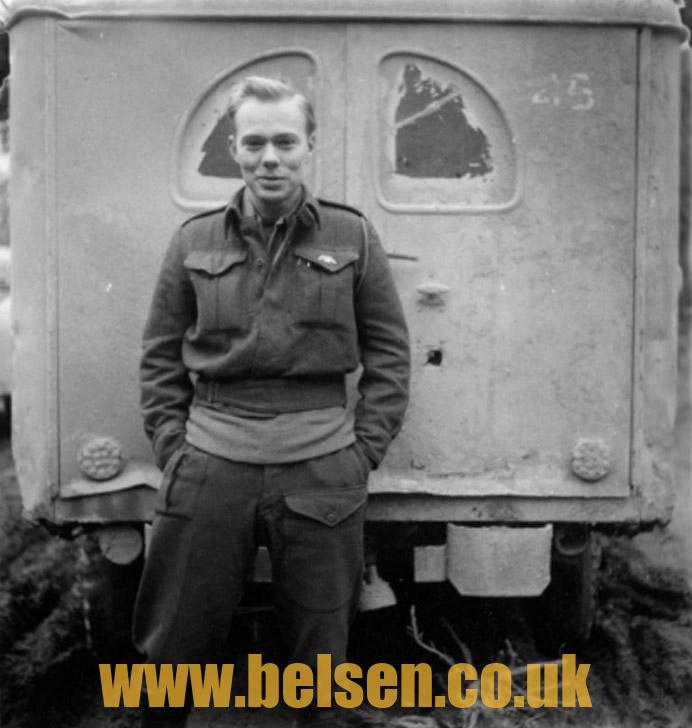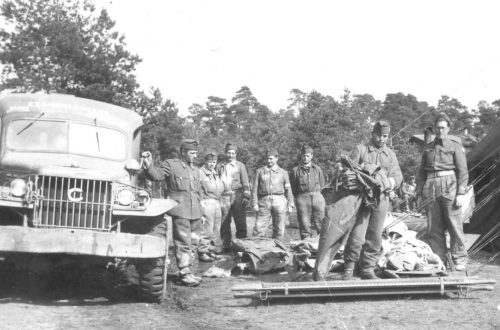Conrad Wilson (AFS) Letter
Conrad Wilson, wrote, including a few rare recollections he wrote about his role as an ambulance driver with the American Field Service searching for survivors when the British Army, with whom he was serving, liberated the camp. This was a part of Conrad’s life that he suppressed for decades after the War, rarely if ever speaking of it. That silence changed, briefly at least, in 1969, when Bill wrote to Dad asking about his role in searching for survivors in the Camp—something that Bill’s father, Dave, had mentioned on occasion but said that his brother never talked about it.

February 16, 1969
Dear Bill:
I was at Belsen Concentration Camp when it was first occupied and stayed until it was emptied out and destroyed. That I will never forget. I will try to give you some idea of what it was like, … I have looked over my letters to home and am disappointed to find I hardly mentioned Belsen in my letters. I guess it was hard to put in writing. Also I see that I only wrote one letter between April and June of 1945 and that was dated May 30th. I quote from it:
“I was up at Belsen Concentration Camp… The tragedy there was greater than anything I had previously seen. Nothing I could say in writing would begin to portray the horrors of the camp. We worked hard each day, cried, prayed and fell exhausted into our beds at night. It is something we shall remember to our dying day. Each of us felt that if we had done nothing else in our lives, Our lives would have been worthwhile just for the little we were able to do in those days at Belsen. The few of us from C Platoon who were there had no cars (ambulances). We worked in the number one camp, the original concentration camp, evacuating people from the huts. I will try to tell you of the conditions when I get home. I cannot write them. Everything I say seems too unreal to me.”
I was with some pretty tough guys – tough in the sense of experience with horror. We had worked at the front lines in Italy, evacuating the wounded, driving all night without lights on dark bomb pitted roads, sometimes, with an urgency to the hospital tempered with knowing what pain each bump caused the wounded soldier. We were a mixture of freaks, daredevils, religious fanatics, etc. hard drinking (straight gin before breakfast!), good and bad. But most of us had been through difficult campaigns and were some what hardened to suffering. My first impression of Belsen was of these same Americans, on first sight of the misery there vomiting, crying, cursing or praying. I saw strong men down on their knees asking for forgiveness for being people I suppose. But it was much worse than anything we had ever seen, read about or imagined. You know propaganda was rather strong in war time, and liberal-minded people were inclined to disbelieve what the newspapers said about the atrocities. I especially. The prisoners I met at times seemed just like the rest of us, harmless enough. Just people. So we were unprepared for Belsen.
Our job was to evacuate the barracks where the prisoners were housed. At that time I was not driving an ambulance but acting as a spare driver. So I was assigned to the job of going into a hut, preparing the people for evacuation, and loading the ambulance. The driver then took them to the “human laundry” where they were shaved, scrubbed, fumigated, sprayed, and if they survived that, evacuated to a tent hospital outside he concentration camp.
Belsen was peculiar in that there was no slaughter of Jews, no gas chambers, but a general level of health that was worse than all other camps. In all fairness to the Germans, I believe, and was told that this was caused by events of the war – the cutting off of rail lines and supplies towards the end of the war, and that a general starvation and epidemic of disease resulted. Be that as it may, the result was that everyone was either dead or close to dead of starvation and typhus or other illnesses. I would go to the hut on the list – a long low frame building like our CCC barracks on the 1930’s – and find it absolutely jammed with people, dead and dying, the living on top of the dead, not even able to know what was happening. Some would resist, not knowing if they were being taken out to be killed. I had to choose whether to take this one or that, taking the strongest first in hope that they might still live, sometimes leaving till last those who seemed dead or not likely to survive. I t seems to me after all these years after, that they were like sardines in a can, the bottom layer dead the top just crawling around over the dead, and sometimes you had to dig through the dead because you saw an arm moving through the bodies that indicated that someone was alive underneath. Is it just a dream? I don’t think so, because I remember thinking at the time that it could never be really exaggerated, no words could really describe the horror of it.
You see, we had arrived too late for most. There were thousands of unburied dead…I can remember that with bulldozers the army dug great long and deep trenches, perhaps twenty feet deep, fifteen feet wide and long as our house, they seemed. And into these the bodies were placed in rows and layers. A layer of bodies, quick lime, some dirt and then another layer of bodies, and so on up to the top. I know one was filled and another was dug. And I saw the former guards, not Germans but Hungarians, Polish etc. who were also prisoners who cooperated with the higher ups and thus got special privileges, assigned now by the British to work day and night burying the dead, 24 hours around the clock ay after day until they fell exhausted and were pushed into the pit and covered up alive (by our side).
This was the worst horror of Belsen, to me. That we, who were so shocked by what we saw, could turn around and do the same thing to those who caused this misery. Of course we were on the right side; these others did not deserve to live after what they had done to the prisoners. I can remember thinking very strongly that the horror was not that Germans had done this to Jews, but that humans had done this to other humans. This impressed me most of all. I felt no real shock at the Germans, but can assure you that I was pretty shocked at us humans. And I guess that is about all I can say to you now… I guess we were all on trial at Nuremburg. But I wish we could all have felt it, and learned from it…
It took us about a month to clear the camp, as I remember. Then when it was empty, it was burned to the ground. I spent some time later with German friends I had met at Bassum near Bremen. I tried to tell them about the experience, but they couldn’t really comprehend that such events took place in their beloved country. And these were really nice people, just like our families, perhaps even better educated than our Wilsons. How could it have happened? Were they also to blame? I guess we were just about as much to blame. And are today to blame for those things that happen here that we don’t want to know about. We can all be really ignorant of things we don’t want to know.
Conrad Wilson
Villanova, Pennsylvania
13,463 total views

